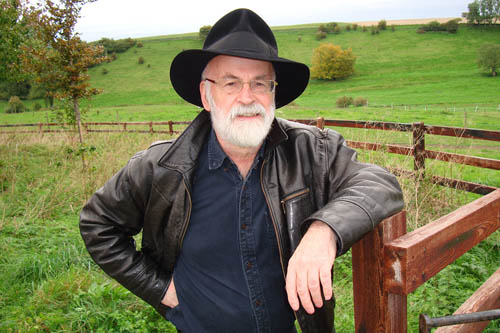 In his introduction to A SLIP OF THE KEYBOARD: Collected Nonfiction by Terry Pratchett, English genre fiction superstar Neil Gaiman wrote of his friend and fellow English genre fiction superstar that he was driven not by joy, like some “jolly old elf,” but by fury --- and anger “about Terry’s underlying sense of what is fair and what is not.”
In his introduction to A SLIP OF THE KEYBOARD: Collected Nonfiction by Terry Pratchett, English genre fiction superstar Neil Gaiman wrote of his friend and fellow English genre fiction superstar that he was driven not by joy, like some “jolly old elf,” but by fury --- and anger “about Terry’s underlying sense of what is fair and what is not.”
“Terry Pratchett,” Gaiman wrote, “is not one to go gentle into any night, good or otherwise.”
On Thursday, Pratchett left us for that night. As he put it in his masterwork of science fiction, the Discworld series, he has taken the long walk across the desert. News came from all across the literary world, but one piece stood out --- a Tweet from Pratchett’s daughter, Rhianna, in the trademark capitalized voice of Pratchett’s conception of Death.
Born in Beaconsfield, England, Pratchett published his first story at age 13, before cutting his teeth as a journalist at Buckinghamshire’s Bucks Free Press weekly paper. In 1971, he published his debut novel, THE CARPET PEOPLE; his first Discworld novel, THE COLOUR OF MAGIC, was released 12 years later. In the 1990s, he was the United Kingdom’s bestselling author and sold more than 85 million books worldwide. He was knighted in 2009 for his services to the realm of literature and was honored with the World Fantasy Award for Life Achievement in 2010.
In a statement, Pratchett’s publisher, Larry Finlay, said: “The world has lost one of its brightest, sharpest minds. In over 70 books, Terry enriched the planet like few before him. As all who read him know, Discworld was his vehicle to satirize this world: he did so brilliantly, with great skill, enormous humour and constant invention.”
Pratchett, 66, had been struggling very publicly with Alzheimer’s for the past few years. Diagnosed in 2007, he continued to write up until completing his final Discworld novel in 2014, when he entered the final stages of the illness.
Gaiman knew of his friend’s inevitable fate when writing his introduction. “As Terry walks into the darkness much too soon,” he writes, “I find myself raging too: at the injustice that deprives us of --- what? Another 20 or 30 books? Another shelf-full of ideas and glorious phrases and old friends and new, of stories in which people do what they really do best, which is use their heads to get themselves out of the trouble they got into by not thinking? Another book or two of journalism and agitprop? But truly, the loss of these things does not anger me as it should. It saddens me, but I, who have seen some of them being built close-up, understand that any Terry Pratchett book is a small miracle, and we already have more than might be reasonable, and it does not behoove any of us to be greedy.”
Often, losing a literary icon feels like a massive shift in our cultural balance, as if we lost not one human but hundreds, or thousands. We forget that storytellers, too, like the tales they spin, have beginnings and ends. But in his novel, GOING POSTAL, Pratchett, a man who wrote often of the concept of death, reminds us that not all endings are truly that. “Do you not know,” he writes, “that a man is not dead while his name is still spoken?”
In 1990, Gaiman and Pratchett wrote a novel together, a comedy about the Apocalypse called GOOD OMENS: The Nice and Accurate Prophecies of Agnes Nutter, Witch. In one scene, a delivery man, dying, is “falling through a grey mist, and all he could see were two spots of blue, that might have been eyes, and might been distant stars.” In his last moments, a typically sardonic Death offers a quip with just a hint of comfort:
“‘DON'T THINK OF IT AS DYING,’ said Death. ‘JUST THINK OF IT AS LEAVING EARLY TO AVOID THE RUSH.’”
Good luck out there in the desert, Terry. You’ll be missed.


